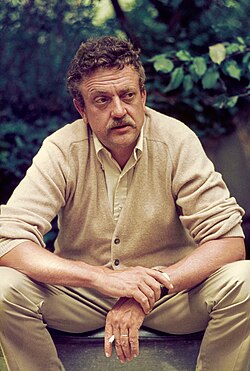Kurt Vonnegut Jr. Quote
You hate America, don't you?' 'That would be as silly as loving it,' I said. 'It's impossible for me to get emotional about it, because real estate doesn't interest me. It's no doubt a great flaw in my personality, but I can't think in terms of boundaries. Those imaginary lines are as unreal to me as elves and pixies. I can't believe that they mark the end or the beginning of anything of real concern to a human soul. Virtues and vices, pleasures and pains cross boundaries at will.
Kurt Vonnegut Jr.
You hate America, don't you?' 'That would be as silly as loving it,' I said. 'It's impossible for me to get emotional about it, because real estate doesn't interest me. It's no doubt a great flaw in my personality, but I can't think in terms of boundaries. Those imaginary lines are as unreal to me as elves and pixies. I can't believe that they mark the end or the beginning of anything of real concern to a human soul. Virtues and vices, pleasures and pains cross boundaries at will.
Related Quotes
According to Melanie Klein, we develop moral responses in reaction to questions of survivability. My wager is that Klein is right about that, even as she thwarts her own insight by insisting that it i...
Judith Butler
Tags:
boundaries, butler, dissociation, grief, klein, life, loss, morality, otherness, self preservation
About Kurt Vonnegut Jr.
Kurt Vonnegut ( VON-ə-gət; November 11, 1922 – April 11, 2007) was an American author known for his satirical and darkly humorous novels. His published work includes fourteen novels, three short-story collections, five plays, and five nonfiction works over fifty-plus years; further works have been published since his death.
Born and raised in Indianapolis, Vonnegut attended Cornell University, but withdrew in January 1943 and enlisted in the U.S. Army. As part of his training, he studied mechanical engineering at the Carnegie Institute of Technology and the University of Tennessee. He was then deployed to Europe to fight in World War II and was captured by the Germans during the Battle of the Bulge. He was interned in Dresden, where he survived the Allied bombing of the city in a meat locker of the slaughterhouse where he was imprisoned. After the war, he married Jane Marie Cox. He and his wife both attended the University of Chicago while he worked as a night reporter for the City News Bureau.
Vonnegut published his first novel, Player Piano, in 1952. It received positive reviews yet sold poorly. In the nearly 20 years that followed, several well regarded novels were published, including The Sirens of Titan (1959) and Cat's Cradle (1963), both of which were nominated for the Hugo Award for best science fiction or fantasy novel of the year. His short-story collection, Welcome to the Monkey House, was published in 1968.
Vonnegut's breakthrough was his commercially and critically successful sixth novel, Slaughterhouse-Five (1969). Its anti-war sentiment resonated with its readers amid the Vietnam War, and its reviews were generally positive. It rose to the top of The New York Times Best Seller list and made Vonnegut famous. Later in his career, Vonnegut published autobiographical essays and short-story collections such as Fates Worse Than Death (1991) and A Man Without a Country (2005). He has been hailed for his darkly humorous commentary on American society. His son Mark published a compilation of his work, Armageddon in Retrospect, in 2008. In 2017, Seven Stories Press published Complete Stories, a collection of Vonnegut's short fiction.
Born and raised in Indianapolis, Vonnegut attended Cornell University, but withdrew in January 1943 and enlisted in the U.S. Army. As part of his training, he studied mechanical engineering at the Carnegie Institute of Technology and the University of Tennessee. He was then deployed to Europe to fight in World War II and was captured by the Germans during the Battle of the Bulge. He was interned in Dresden, where he survived the Allied bombing of the city in a meat locker of the slaughterhouse where he was imprisoned. After the war, he married Jane Marie Cox. He and his wife both attended the University of Chicago while he worked as a night reporter for the City News Bureau.
Vonnegut published his first novel, Player Piano, in 1952. It received positive reviews yet sold poorly. In the nearly 20 years that followed, several well regarded novels were published, including The Sirens of Titan (1959) and Cat's Cradle (1963), both of which were nominated for the Hugo Award for best science fiction or fantasy novel of the year. His short-story collection, Welcome to the Monkey House, was published in 1968.
Vonnegut's breakthrough was his commercially and critically successful sixth novel, Slaughterhouse-Five (1969). Its anti-war sentiment resonated with its readers amid the Vietnam War, and its reviews were generally positive. It rose to the top of The New York Times Best Seller list and made Vonnegut famous. Later in his career, Vonnegut published autobiographical essays and short-story collections such as Fates Worse Than Death (1991) and A Man Without a Country (2005). He has been hailed for his darkly humorous commentary on American society. His son Mark published a compilation of his work, Armageddon in Retrospect, in 2008. In 2017, Seven Stories Press published Complete Stories, a collection of Vonnegut's short fiction.
